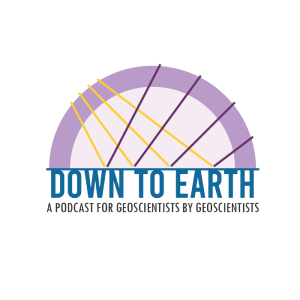
Down To Earth: A podcast for Geoscientists by Geoscientist
Science Podcasts
Welcome to “Down to Earth”, a 30-minute podcast about innovative geoscience and the incredible people behind it. Each week, we host a different guest to talk about science, careers, and passions. From stories about meeting their idols, to investigating their science superpowers, and all the fascinating research and engineering projects in between, Down to Earth is sure to become your quick and compelling catch-up on the people and the work in geoscience. This podcast is presented by the IEEE Geoscience and Remote Sensing Society.
Location:
United States
Genres:
Science Podcasts
Description:
Welcome to “Down to Earth”, a 30-minute podcast about innovative geoscience and the incredible people behind it. Each week, we host a different guest to talk about science, careers, and passions. From stories about meeting their idols, to investigating their science superpowers, and all the fascinating research and engineering projects in between, Down to Earth is sure to become your quick and compelling catch-up on the people and the work in geoscience. This podcast is presented by the IEEE Geoscience and Remote Sensing Society.
Twitter:
@ieee_grss
Language:
English
Email:
ir_pub@grss-ieee.org
S06E08 Down to Earth: Help or Hindrance? The Ethics of AI-Driven Geoscience
Duration:00:33:07
S06E07 Down to Earth: AI to the Rescue: The Power of Partnership in AI4EO
Duration:00:34:20
S06E06 Down to Earth: Geospatial Foundation Models For Real-World Challenges
Duration:00:33:43
S06E05 Down to Earth: Training scientists on high performance computing
Duration:00:32:52
S06E04 Down to Earth: Supercomputing and GeoAI
Duration:00:34:44
S06E03 Down to Earth: Revving up AI in Geoscience: The Hardware Revolution
Duration:00:38:18
S06E02 Down to Earth: AI’s Secret Sauce: Quality Data
Duration:00:35:00
S06E01 Down to Earth: Demystifying AI in Geoscience
Duration:00:32:10
Down to Earth Season 6: AI4EO Trailer
Duration:00:01:10
S05E08 Down to Earth: Food Security
Duration:00:32:31
S05E07 Down to Earth: Water Resources
Duration:00:28:38
S05E06 Down to Earth: Sea Ice
Duration:00:35:31
S05E05 Down to Earth: Glaciers
Duration:00:36:37
S05E04 Down to Earth: Aerosols
Duration:00:32:57
S05E03 Down to Earth: Permafrost
Duration:00:35:21
S5E02 Down to Earth: Wetlands
Duration:00:34:00
S5E01 Down to Earth: Forest Ecosystems
Duration:00:34:33
Down to Earth: Season 5 Trailer
Duration:00:01:22
S4E10 Down to Earth: Training for culture change in Open Science
Duration:00:31:12
S4E09 Down to Earth: Getting the Green for Open Science
Duration:00:33:27